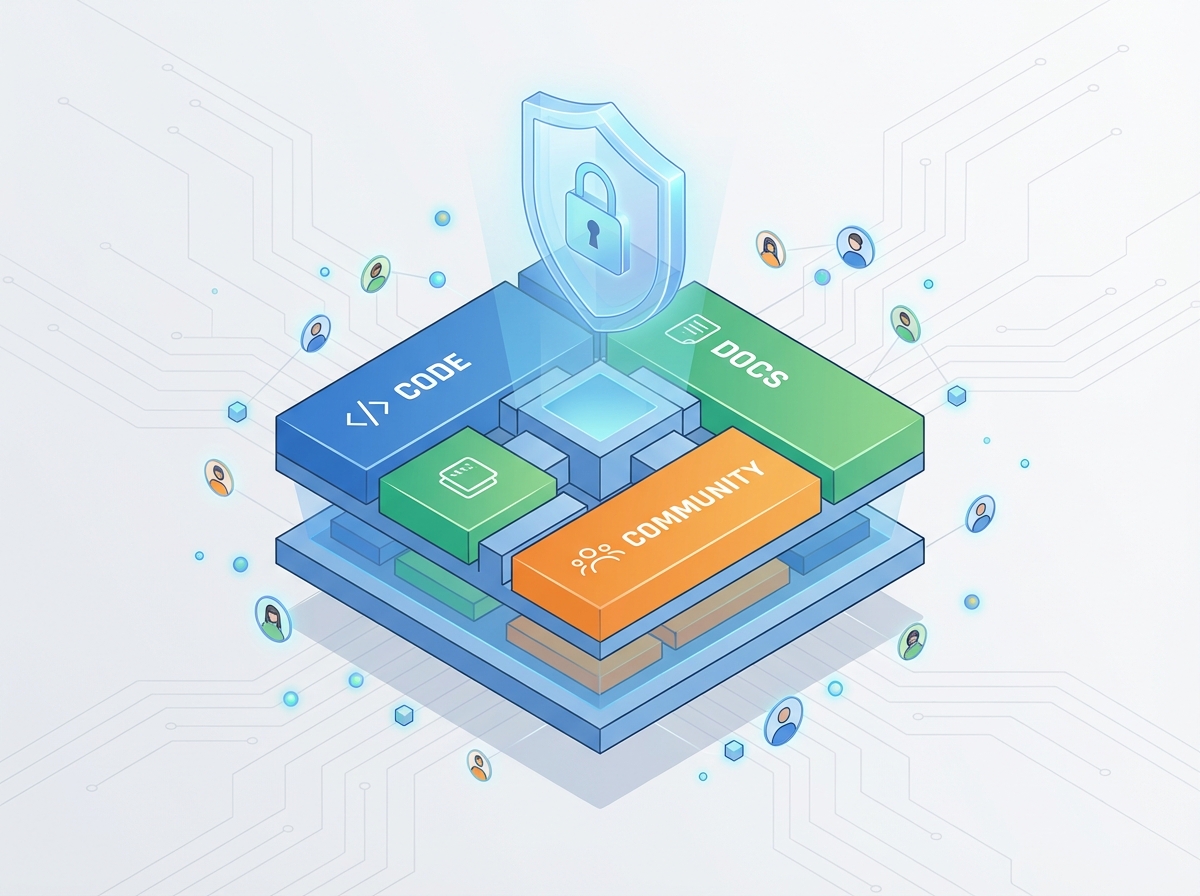
Having contributed to and maintained open source projects across enterprise and community environments for over a decade, I’ve observed that successful open source participation requires understanding both technical contribution patterns and community dynamics. The evolution from initial contributor to project maintainer reveals systematic approaches to building sustainable software communities and establishing technical leadership within distributed development environments.
Strategic Value of Open Source Participation
Technical Excellence Development
- Architecture Exposure: Engagement with large-scale codebases provides insights into system design patterns and architectural decisions that shape production software
- Peer Review Processes: Participation in rigorous code review cycles accelerates technical skill development through exposure to industry best practices and expert feedback
- Pattern Recognition: Observation of established engineering patterns across diverse projects builds intuition for solving complex technical challenges
- Real-World Problem Solving: Contribution to production systems used by thousands of users provides experience with scalability, reliability, and performance challenges
Professional Network Expansion
- Technical Reputation Building: Consistent, high-quality contributions establish credibility within technical communities and demonstrate expertise to potential collaborators
- Global Collaboration Networks: Participation in distributed development teams builds relationships with engineers across diverse organizations and geographic regions
- Career Advancement Opportunities: Open source contributions serve as a portfolio of technical work that demonstrates capabilities to potential employers and collaborators
- Industry Recognition: Sustained contribution to significant projects can lead to speaking opportunities, technical leadership roles, and industry recognition
Ecosystem Impact and Innovation
- Infrastructure Improvement: Contributions to foundational tools and libraries improve the development experience for entire communities of practitioners
- Knowledge Transfer: Documentation and educational contributions accelerate learning for new developers entering the field
- Technological Advancement: Participation in cutting-edge projects contributes to the evolution of software engineering practices and technological capabilities
- Accessibility Enhancement: Focus on inclusive design and accessibility improvements expands technology access to underserved populations

Strategic Project Selection and Evaluation
Dependency-Driven Contribution Strategy
Optimal contribution opportunities emerge from projects within your existing technology stack, where domain knowledge and practical usage experience provide context for meaningful improvements:
# Check your project dependencies
npm list --depth=0
pip list
cargo tree --depth 1
# Look for issues in tools you use daily
# - Your text editor/IDE plugins
# - Build tools and frameworks
# - Libraries in your current projectsProject Viability Assessment Framework
Systematic evaluation of project health indicators ensures contribution efforts target sustainable, well-maintained projects with active communities:
Development Velocity Metrics
- Commit Frequency: Consistent development activity indicating active maintenance and feature development
- Issue Resolution Patterns: Systematic issue triage and resolution demonstrating responsive maintainer engagement
- Pull Request Throughput: Regular merge activity with constructive feedback cycles indicating healthy review processes
- Release Cadence: Predictable release schedules with comprehensive changelog documentation
Community Infrastructure Assessment
- Governance Documentation: Explicit community guidelines and behavioral expectations that ensure inclusive participation
- Contribution Frameworks: Comprehensive onboarding documentation that reduces friction for new contributors
- Documentation Standards: High-quality technical documentation that demonstrates project maturity and maintainer commitment
- Community Engagement Patterns: Evidence of constructive collaboration and mentorship within the contributor community
Contribution Entry Point Identification
Effective project maintainers implement systematic labeling strategies to facilitate new contributor onboarding:
good first issue- Indicates well-scoped problems suitable for initial contributionsbeginner-friendly- Denotes issues requiring minimal domain-specific knowledgehelp wanted- Signals maintainer availability for guidance and supportdocumentation- Identifies opportunities for non-code contributions that improve project accessibilityeasy- Marks low-complexity issues that provide quick wins for new contributors
Types of Contributions
Code Contributions
Bug Fixes
Start with small, well-defined bugs:
// Example: Fix off-by-one error
// Before
function getLastItems(array, count) {
return array.slice(array.length - count - 1);
}
// After
function getLastItems(array, count) {
return array.slice(array.length - count);
}Feature Implementation
Implement small, focused features:
# Example: Add configuration option
class DatabaseConfig:
def __init__(self, host, port, timeout=30):
self.host = host
self.port = port
self.timeout = timeout # New configurable timeout
def get_connection_string(self):
return f"postgresql://{self.host}:{self.port}?timeout={self.timeout}"Documentation Contributions
Documentation is often the most impactful contribution:
README Improvements
# Before
## Installation
Run `npm install`
# After
## Installation
### Prerequisites
- Node.js 16.0 or higher
- npm 7.0 or higher
### Quick Start# Clone the repository
git clone https://github.com/user/project.git
cd project
# Install dependencies
npm install
# Run the development server
npm run devThe application will be available at http://localhost:3000
API Documentation
/**
* Fetches user data from the API
* @param {string} userId - The unique identifier for the user
* @param {Object} options - Configuration options
* @param {boolean} options.includeProfile - Whether to include profile data
* @param {number} options.timeout - Request timeout in milliseconds (default: 5000)
* @returns {Promise<User>} Promise that resolves to user data
* @throws {UserNotFoundError} When user doesn't exist
* @throws {NetworkError} When request fails
*
* @example
* const user = await fetchUser('123', { includeProfile: true });
* console.log(user.name);
*/
async function fetchUser(userId, options = {}) {
// Implementation
}Testing Contributions
Add tests to improve project reliability:
// Unit tests
describe('UserValidator', () => {
test('should validate email format', () => {
expect(UserValidator.isValidEmail('[email protected]')).toBe(true);
expect(UserValidator.isValidEmail('invalid-email')).toBe(false);
});
test('should handle edge cases', () => {
expect(UserValidator.isValidEmail('')).toBe(false);
expect(UserValidator.isValidEmail(null)).toBe(false);
expect(UserValidator.isValidEmail(undefined)).toBe(false);
});
});
// Integration tests
describe('API Integration', () => {
test('should create user successfully', async () => {
const userData = {
name: 'Test User',
email: '[email protected]'
};
const response = await request(app)
.post('/api/users')
.send(userData)
.expect(201);
expect(response.body.id).toBeDefined();
expect(response.body.name).toBe(userData.name);
});
});
The Contribution Process
1. Research and Planning
Before writing code:
# Fork the repository
# Clone your fork
git clone https://github.com/yourusername/project.git
cd project
# Add upstream remote
git remote add upstream https://github.com/original/project.git
# Create a feature branch
git checkout -b fix/issue-123-memory-leakRead the Contributing Guidelines
Every project should have a CONTRIBUTING.md file. Read it carefully for:
- Code style requirements
- Testing expectations
- Pull request process
- Development setup instructions
Understand the Issue
- Read the issue description thoroughly
- Ask clarifying questions if needed
- Check if someone else is already working on it
- Understand the expected behavior
2. Development Best Practices
Write Clean, Focused Code
// Good: Single responsibility, clear naming
function calculateTotalPrice(items, taxRate, discountPercent = 0) {
const subtotal = items.reduce((sum, item) => sum + item.price, 0);
const discountAmount = subtotal * (discountPercent / 100);
const discountedSubtotal = subtotal - discountAmount;
const tax = discountedSubtotal * taxRate;
return discountedSubtotal + tax;
}
// Bad: Multiple responsibilities, unclear naming
function calc(items, tr, d) {
let t = 0;
for (let i = 0; i < items.length; i++) {
t += items[i].price;
}
if (d) t = t - (t * d / 100);
return t + (t * tr);
}Follow Project Conventions
# If the project uses this style:
def get_user_by_id(user_id: int) -> Optional[User]:
"""Retrieve user by ID."""
return database.query(User).filter(User.id == user_id).first()
# Don't submit this:
def getUserById(userId):
return database.query(User).filter(User.id == userId).first()Write Comprehensive Tests
// Test the happy path
test('should process valid payment', async () => {
const payment = { amount: 100, currency: 'USD' };
const result = await processPayment(payment);
expect(result.status).toBe('success');
expect(result.transactionId).toBeDefined();
});
// Test edge cases
test('should handle zero amount', async () => {
const payment = { amount: 0, currency: 'USD' };
await expect(processPayment(payment))
.rejects
.toThrow('Amount must be greater than zero');
});
// Test error conditions
test('should handle network failures', async () => {
mockPaymentGateway.mockRejectedValue(new NetworkError());
const payment = { amount: 100, currency: 'USD' };
await expect(processPayment(payment))
.rejects
.toThrow('Payment processing failed');
});3. Creating Quality Pull Requests
Write Descriptive Commit Messages
# Good commit messages
git commit -m "fix: resolve memory leak in user session cleanup
- Add proper cleanup of event listeners in UserSession
- Implement timeout for abandoned sessions
- Add unit tests for session lifecycle
Fixes #123"
# Bad commit messages
git commit -m "fix bug"
git commit -m "update code"
git commit -m "changes"Pull Request Template
## Description
Brief description of the changes and why they're needed.
## Type of Change
- [ ] Bug fix (non-breaking change which fixes an issue)
- [ ] New feature (non-breaking change which adds functionality)
- [ ] Breaking change (fix or feature that would cause existing functionality to not work as expected)
- [ ] Documentation update
## Testing
- [ ] Unit tests pass
- [ ] Integration tests pass
- [ ] Manual testing completed
## Checklist
- [ ] Code follows project style guidelines
- [ ] Self-review completed
- [ ] Documentation updated
- [ ] Tests added/updated
## Related Issues
Fixes #123
Related to #456
Maintaining Open Source Projects
Project Setup and Documentation
Essential Files
project/
├── README.md # Project overview and quick start
├── CONTRIBUTING.md # Contribution guidelines
├── CODE_OF_CONDUCT.md # Community standards
├── LICENSE # Legal terms
├── CHANGELOG.md # Version history
├── .github/
│ ├── ISSUE_TEMPLATE/ # Issue templates
│ ├── PULL_REQUEST_TEMPLATE.md
│ └── workflows/ # CI/CD workflows
└── docs/ # Detailed documentationREADME Best Practices
# Project Name
Brief, compelling description of what the project does.
## Features
- Key feature 1
- Key feature 2
- Upcoming feature (in progress)
## Quick Start
### Installation
```bash
npm install project-nameBasic Usage
const project = require('project-name');
const result = project.doSomething();Documentation
- [API Reference](docs/api.md)
- [Examples](examples/)
- [Contributing](CONTRIBUTING.md)
License
MIT © Your Name
Community Management
Issue Triage
<!-- Issue template -->
## Bug Report
**Describe the bug**
A clear description of what the bug is.
**To Reproduce**
Steps to reproduce the behavior:
1. Go to '...'
2. Click on '....'
3. See error
**Expected behavior**
What you expected to happen.
**Environment**
- OS: [e.g. macOS 12.0]
- Node.js version: [e.g. 16.14.0]
- Package version: [e.g. 1.2.3]
**Additional context**
Any other context about the problem.Responding to Contributors
<!-- Welcoming response -->
Hi @contributor! 👋
Thank you for taking the time to report this issue. This looks like a valid bug that affects the user experience.
I've labeled this as `bug` and `good first issue` since it would be a great starting point for new contributors.
Would you be interested in working on a fix? I'd be happy to provide guidance and review your pull request.
If not, no worries! I'll add it to our backlog and we'll address it in a future release.
Thanks again for helping make this project better!Release Management
Semantic Versioning
# Patch release (bug fixes)
1.0.0 → 1.0.1
# Minor release (new features, backward compatible)
1.0.1 → 1.1.0
# Major release (breaking changes)
1.1.0 → 2.0.0Changelog Maintenance
# Changelog
## [1.2.0] - 2025-01-15
### Added
- New configuration option for timeout settings
- Support for custom error handlers
### Changed
- Improved error messages for better debugging
- Updated dependencies to latest versions
### Fixed
- Memory leak in session cleanup
- Race condition in concurrent requests
### Deprecated
- `oldMethod()` will be removed in v2.0.0, use `newMethod()` instead
## [1.1.0] - 2025-01-01
...Building Community Projects
Curated Lists (like awesome-mcp-servers)
Structure and Organization
# Awesome MCP Servers [](https://awesome.re)
A curated list of Model Context Protocol (MCP) servers.
## Contents
- [Official Servers](#official-servers)
- [Community Servers](#community-servers)
- [Development Tools](#development-tools)
- [Resources](#resources)
## Official Servers
- [filesystem](https://github.com/modelcontextprotocol/servers/tree/main/src/filesystem) - File system operations
- [git](https://github.com/modelcontextprotocol/servers/tree/main/src/git) - Git repository management
## Community Servers
- [gopher-mcp](https://github.com/cameronrye/gopher-mcp) - Access Gopher and Gemini protocols
- [openzim-mcp](https://github.com/cameronrye/openzim-mcp) - Offline knowledge base access
## Contributing
Please read the [contribution guidelines]\(CONTRIBUTING.md) before submitting a pull request.Quality Standards
## Contribution Guidelines
### Adding a Server
To add a server to this list, please ensure it meets these criteria:
1. **Functionality**: The server must be functional and well-tested
2. **Documentation**: Clear README with installation and usage instructions
3. **Maintenance**: Active maintenance with recent commits
4. **License**: Open source license clearly specified
5. **Quality**: Code follows best practices and includes tests
### Submission Format
```markdown
- [server-name](https://github.com/user/repo) - Brief description of what it doesReview Process
- Submit a pull request with your addition
- Maintainers will review within 48 hours
- Address any feedback promptly
- Once approved, your server will be added to the list
## Common Pitfalls and How to Avoid Them
### For Contributors
#### Don't Take Rejection Personally
```markdown
<!-- Example of constructive feedback -->
Thanks for the pull request! The feature idea is interesting, but I have some concerns about the implementation:
1. This adds significant complexity to the core API
2. The use case seems quite specific
3. It might be better implemented as a plugin
Would you be open to exploring a plugin-based approach instead? I'd be happy to help design the plugin interface.Start Small
- Fix typos before tackling major features
- Add tests before implementing new functionality
- Improve documentation before refactoring code
For Maintainers
Set Clear Expectations
## Response Times
- Issues: We aim to respond within 48 hours
- Pull Requests: Initial review within 1 week
- Security Issues: Response within 24 hours
## What We're Looking For
- Bug fixes with tests
- Documentation improvements
- Performance optimizations
- Accessibility improvements
## What We're Not Looking For
- Breaking changes without discussion
- Features that significantly increase complexity
- Code without testsAutomate What You Can
# .github/workflows/ci.yml
name: CI
on: [push, pull_request]
jobs:
test:
runs-on: ubuntu-latest
steps:
- uses: actions/checkout@v3
- uses: actions/setup-node@v3
with:
node-version: '18'
- run: npm ci
- run: npm test
- run: npm run lint
- run: npm run type-checkStrategic Approach to Open Source Engagement
Open source participation represents more than code contribution—it embodies participation in a global knowledge-sharing ecosystem that drives technological innovation and professional development. Understanding this broader context enables strategic engagement that maximizes both personal growth and community impact.
The cumulative effect of individual contributions creates substantial value across the software engineering ecosystem. Documentation improvements, bug fixes, and feature implementations each contribute to the reliability and usability of tools used by millions of developers worldwide.
Strategic recommendations for sustainable open source engagement:
- Progressive Complexity Management: Begin with low-risk contributions to build familiarity with project workflows and community dynamics
- Process-Oriented Learning: Embrace feedback cycles as opportunities for skill development and professional growth
- Communication Excellence: Prioritize clear, respectful communication that facilitates collaboration across diverse cultural and technical backgrounds
- Continuous Learning Mindset: Approach each interaction as an opportunity to expand technical knowledge and professional networks
- Community Investment: Recognize that today’s support from experienced contributors creates tomorrow’s obligation to mentor new participants
The open source ecosystem represents one of the most effective mechanisms for distributed knowledge transfer and collaborative problem-solving in software engineering. Participation in this ecosystem provides access to cutting-edge technical practices while contributing to the advancement of software engineering as a discipline.
Ready to dive in? Check out awesome-mcp-servers for a beginner-friendly project, or browse GitHub’s Good First Issues to find something that sparks your interest.
Was this helpful?
Have questions about this article?
Ask can help explain concepts, provide context, or point you to related content.